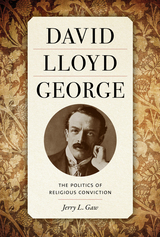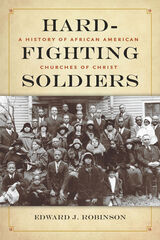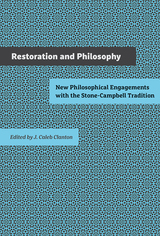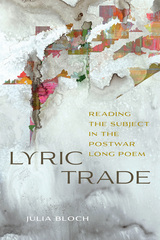
Born on January 17, 1863, in Manchester, England, David Lloyd George is perhaps best known for his service as prime minister of the United Kingdom during the second half of World War I. While many biographies have chronicled his life and political endeavors, few, if any, have explored how his devotion to democratic doctrines in the Church of Christ shaped his political perspectives and choices both before and during the First World War. In David Lloyd George: The Politics of Religious Conviction, Jerry L. Gaw bridges this gap in scholarship, showcasing George’s religious roots and their impact on his politics in the late nineteenth and early twentieth centuries.
With a comprehensive narrative that spans more than a century, Gaw’s book ranges beyond typical biography and examines how the work and theology of Alexander Campbell, a founder
of the Stone-Campbell Movement in America, influenced a prominent world leader. George’s twelve diaries and the more than three thousand letters he wrote to his brother between 1886 and 1943 provide the foundation for Gaw’s thorough analysis of George’s beliefs and politics. Taken together, these texts illuminate his lifelong adherence to the Church of Christ in Britain and how his faith, in turn, contributed to his proclivity for championing humanitarian, egalitarian, and popular political policies beginning with the first of his fifty-five years in the British Parliament.
Broadly, Gaw’s study helps us to understand how the Stone-Campbell tradition—and later, Churches of Christ—became contextualized in the British Isles over the course of the nineteenth century. His significant mining of primary materials successively reveals a lesser-known side of David Lloyd George, in large part explaining how he arrived at the political decisions that helped shape history.


Robinson’s well-researched narrative treats not only the black male leaders of the church, but also women leaders, such as Annie C. Tuggle, as well as notable activities of the church, including music, education, and global evangelism, thus painting a complete picture of African American Churches of Christ. Through scholarship and compelling storytelling, Robinson tells the two-hundred-year tale of how “black believers survived and thrived on the discarded ‘scraps’ of America, forging their own identity, fashioning their own lofty ecclesiology and ‘hard’ theology, and creating their own papers, lectureships, liturgy, and congregations.” A groundbreaking exploration by a seasoned scholar in American religion, Hard-Fighting Soldiers is sure to become the standard text for anyone researching the African American Churches of Christ.

In Restoration and Philosophy, editor J. Caleb Clanton and a team of philosophers engage with the Stone-Campbell Restoration tradition to address issues related to epistemology, philosophy of science, philosophy of religion, moral philosophy, aesthetics, environmentalism, and race. Along the way, the authors help to contextualize the Stone- Campbell Restoration tradition within American religious history—and within Christian philosophy more generally—and they show its continuing relevance today.
Scholars and students of philosophy and religious studies, as as well as ministers and those interested in this uniquely American Christian tradition, will benefit from this carefully edited, thoroughly researched, and highly readable collection of essays by eminent philosophers and religious scholars.
READERS
Browse our collection.
PUBLISHERS
See BiblioVault's publisher services.
STUDENT SERVICES
Files for college accessibility offices.
UChicago Accessibility Resources
home | accessibility | search | about | contact us
BiblioVault ® 2001 - 2024
The University of Chicago Press









